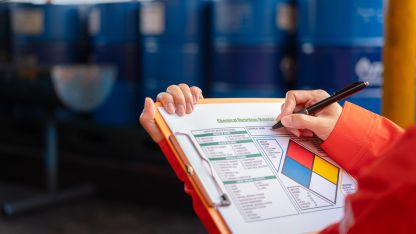Intertek’s Prop 65 compliance services provide valuable support to manufacturers, retailers, and importers worldwide that need to comply with this California right-to-know legislation.
Our CA Prop 65 compliance services relate to the Safe Drinking Water and Toxic Enforcement Act, 1986 (also known as Proposition 65), which is a California law that was set out to promote clean drinking water and inform the public about the presence of toxic substances that cause cancer and/or birth defects in consumer products and their environment.
This regulation is overseen by the Office of Environmental Health Hazard Assessment (OEHHA), which is part of the California Environmental Protection Agency (Cal EPA). The regulation is enforced through the Office of the Attorney General.
If a product, including foods and supplements, sold in California contains a chemical that is listed on the Prop 65 list of chemicals that are “known to the state to cause cancer or reproductive toxicity”, a warning for the product may be required if exposure to that chemical is above the Safe Harbor Level (if one has been established). Failure to comply with the regulations can result in your company being issued a “60-Day Notice” of non-compliance or “Notice of Violation” and your company can be taken to court if a settlement is not reached. Settlement fees can cost companies tens of thousands to as much as several hundred thousand dollars. Compliance with this regulation cannot be ignored.
Intertek has board-certified toxicologists and other scientific professionals that understand the complexities of Prop 65 compliance issues and know how to address them. In conjunction with its laboratory testing facilities, Intertek has critical components for your Proposition 65 compliance needs.
Intertek’s California Prop 65 Services include:
- BPA Warning Label Requirement Services
- Supply chain analysis/data collection
- Compliance Assurance Process implementation and certification
- Chemical Testing and Analysis and screening (XRF) of products, including acrylamide analysis
- Assessing areas of risk for California Prop 65 substances, and providing compliance strategies
- Preparing Prop 65 related positional statements for your company (i.e., in relation to providing arguments against the listing of a chemical on the Proposition 65 list or for de-listing a chemical)
- Deriving “No Significant Risk Levels (NSRLs)” and “Maximum Allowable Dose Levels (MADLs)” for chemicals in the absence of OEHHA derived Safe Harbor Levels
- Conducting exposure assessments to evaluate whether your company’s product complies with the regulations and whether a warning may be required
- Assisting in obtaining Safe Use Determinations for your product(s) from OEHHA
Frequently Asked Questions
No, Prop 65 does not ban any products. While there are over 900 substances on Prop 65, products containing these substances can be sold in the State of California as long as they carry the applicable warning statements on the label. As the warning statement is not ideal for marketing, Intertek can assist with strategy, testing, and exposure assessment to show that your product is in compliance with Prop 65.
Unfortunately, there is not. With over 900 substances on the Prop 65 list, there is not one test that show your product is in compliance with all of them. However, with Intertek Regulatory expertise and strategy support, we can narrow down that list of 900+ to focus on the Prop 65 substances you need to be concerned about.
While some companies commonly state their product is in compliance with a specific Prop 65 substance because they make a similar product, this is not always the case. When using a past settlement, you need to ensure that the products are identical (both in formulation and application), and the concentrations of the Prop 65 substances are extremely close. Otherwise, a separate strategy will have to be completed for your product.
For some applications, yes. For products like food, cosmetics, and other consumer products where the full formulation will be exposed to the consumer, obtaining the concentration of a Prop 65 substance is the best test. However, for products like electronics, hardware, clothing, and others where the product is just touching the skin and removed, wipe testing may the better test. If you are concerned with Prop 65 substances in packaging, migration studies may be the best test. Luckily, Intertek can assist with the strategy to choose the best test and has the laboratories to perform that test.
While Prop 65 only applies to products sold in the State of California, it is very difficult to keep products sold in the United States out of one specific State. California is the country's most populous State and if they were a country, represents the fourth largest economy in the world. Avoiding California is extremely difficult, especially with the different ways products are sold electronically.

Restricted Substances News
Webinars:
Blogs:
White Papers:
Brochures:

Chemical News
Webinars:
Blogs:
White Papers:
- Safety Data Sheets: Evaluation, Creation, Compliance, and Future Trends
- Ensuring Compliance with Safety Data Sheets
- Microorganism and Biotechnology Regulation In Canada and The United States
- The EU Biocides Product Regulation
- PFAS Regulations in the United States
Brochures:
